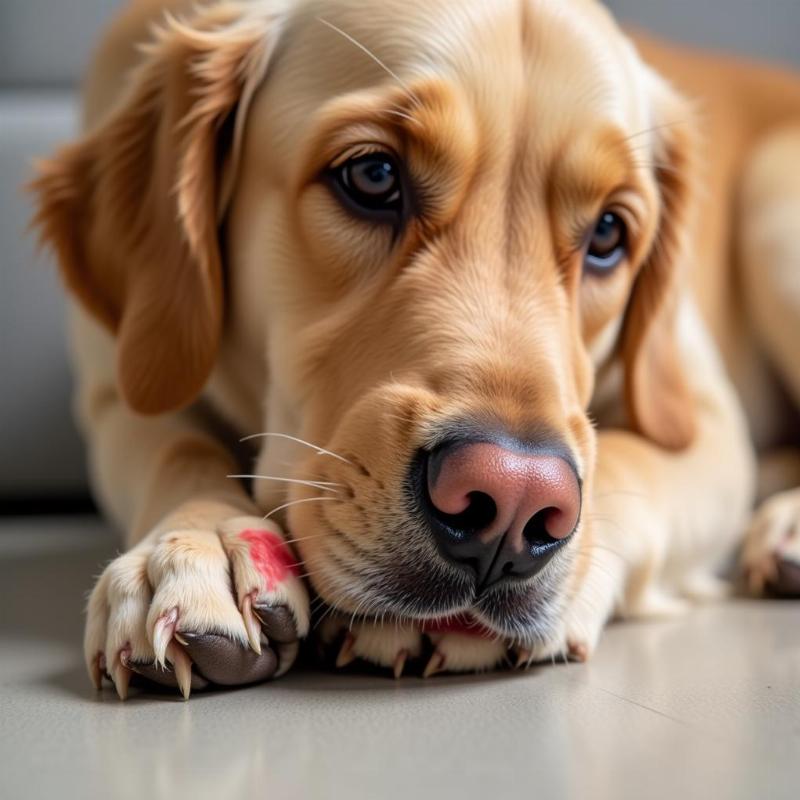Chewing paws can be a frustrating and concerning behavior in dogs. It can range from occasional licking to relentless gnawing, often leaving paws red, swollen, and even injured. Understanding why your dog is chewing their paws is the first step to stopping this behavior and ensuring their comfort and well-being. This article will explore the common causes of paw chewing in dogs, provide practical solutions, and offer advice on when to seek professional veterinary help.
 Worried dog chewing paw
Worried dog chewing paw
Why is My Dog Chewing Their Paws?
Several factors can contribute to paw chewing, ranging from environmental irritants to underlying medical conditions. Identifying the root cause is crucial for effective treatment.
Allergies
Allergies are a common culprit, and they can be triggered by various substances, including pollen, dust mites, mold, and certain food ingredients. These allergens can cause inflammation and itching, leading your dog to chew their paws for relief. Consider switching to hypoallergenic dog food and consulting your vet about allergy testing.
Parasites
Fleas, ticks, and mites can infest a dog’s paws, causing intense itching and irritation. Regular preventative treatments are essential, especially during warmer months. Examine your dog’s paws regularly for signs of parasites.
Dry Skin
Just like humans, dogs can suffer from dry skin, which can be itchy and uncomfortable. Environmental factors, such as dry air or exposure to harsh chemicals, can exacerbate the problem. Using a dog-specific moisturizer can help alleviate dryness and reduce chewing.
Infections
Bacterial or fungal infections can develop between a dog’s toes, causing itching, redness, and even a foul odor. If you suspect an infection, consult your veterinarian for diagnosis and treatment.
Anxiety and Boredom
In some cases, paw chewing can be a behavioral issue stemming from anxiety or boredom. Providing plenty of mental and physical stimulation, such as interactive toys and regular exercise, can help alleviate this. why do dogs chew their nails might offer additional insights into nail biting, a related behavior.
How to Stop Your Dog From Chewing Their Paws
Once you’ve identified the potential cause, you can take steps to address the issue and stop the chewing.
Veterinary Care
If you suspect allergies, infections, or other medical conditions, consult your veterinarian. They can diagnose the problem and prescribe appropriate medications, such as antihistamines, antifungals, or antibiotics.
Environmental Management
Minimize exposure to potential allergens by regularly cleaning your home, washing your dog’s bedding, and keeping their paws clean. dog gone smart dirty dog doormat might be helpful in keeping paws clean.
Dietary Changes
If food allergies are suspected, your veterinarian may recommend an elimination diet to identify the offending ingredient. Switching to a hypoallergenic dog food can often significantly reduce allergic reactions and paw chewing.
Behavioral Modification
For anxiety-related chewing, consider providing calming aids, such as pheromone diffusers or anxiety vests. Increase exercise and mental stimulation to keep your dog engaged and happy. You might find useful information in can dogs bite their nails off.
Paw Care
Regularly trimming your dog’s nails can prevent them from catching and causing irritation. Keeping the paws clean and moisturized can also help prevent dryness and cracking. my dogs paw is bleeding provides advice on dealing with paw injuries.
Conclusion
Stopping your dog from chewing their paws requires a multifaceted approach that addresses the underlying cause. By carefully observing your dog, consulting with your veterinarian, and implementing the appropriate solutions, you can help your furry friend find relief and enjoy healthy, happy paws. Remember that patience and consistency are key to successfully addressing this often frustrating behavior.
FAQ
-
How can I tell if my dog’s paw chewing is due to allergies? Other allergy symptoms, such as sneezing, itching, and ear infections, often accompany paw chewing.
-
What are some signs of a paw infection? Redness, swelling, discharge, a foul odor, and limping can indicate a paw infection.
-
Is it okay to use human moisturizer on my dog’s paws? No, it’s best to use a veterinarian-recommended dog-specific moisturizer.
-
How can I keep my dog entertained to prevent boredom-related chewing? Provide interactive toys, puzzle feeders, and regular exercise.
-
When should I take my dog to the vet for paw chewing? If the chewing is persistent, severe, or accompanied by other symptoms, consult your veterinarian.
Related Articles
Beautdogs.us is your premier destination for all things dog-related in the US. We provide expert advice on dog breeds, grooming, training, nutrition, and overall wellness. Whether you’re a seasoned dog owner or just starting your journey with a furry companion, Beautdogs.us is your trusted source for comprehensive and engaging dog care information. Contact us today for expert advice! Email: [email protected], Phone: +1 501-555-7529.